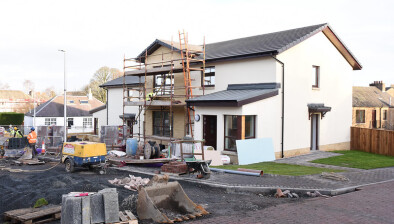Coalition calls for an end to scourge of Scotland’s cold homes
 A coalition is urging the Scottish Government to substantially increase the funding available to improve the energy efficiency of Scotland’s homes ahead of a debate today in the Scottish Parliament.
A coalition is urging the Scottish Government to substantially increase the funding available to improve the energy efficiency of Scotland’s homes ahead of a debate today in the Scottish Parliament.
The Existing Homes Alliance, whose members include WWF Scotland, Changeworks and the National Insulation Association, has called for a commitment to lift all homes to the Energy Performance Certificate Band C standard by 2025.
Speaking on behalf of the Alliance, Fabrice Leveque, climate and energy policy officer at WWF Scotland, said: “It’s a national shame that there are nearly 850,000 households in Scotland living in fuel poverty, and that energy inefficient homes are preventing many of those from escaping that poverty. That’s why we’re calling all on all political parties to support greater investment in energy efficiency measures and end the scourge of cold, damp, unhealthy homes.
“The Scottish Government already has all the powers it needs to improve the quality of the homes we live in, we now need to see a commitment in the draft budget that will lift all homes to the Energy Performance Certificate Band C standard by 2025.
“Investment in energy efficiency is a no-brainer, working alongside efforts to raise incomes and reduce energy costs, it will help lift people out of fuel poverty, stimulate the economy, create jobs and cut our climate change emissions.”
The Scottish Conservatives have themselves called for a “transformational change” to help tackle fuel poverty in Scotland.
The party’s communities spokesman Adam Tomkins said he will today urge the Scottish Government to invest heavily in improving energy efficiency.
People living in a home with low energy performance are three and a half times more likely to be suffering from fuel poverty as those in a home with high energy performance.
As such, the Scottish Conservatives have called for £1 billion to be invested over the next five years to ensure that all homes meet the EPC C rating or above by the end of the next decade – a call supported by the recent Scottish Fuel Poverty Strategic Working Group report.
Currently 1.4 million out of Scotland’s two and a half million homes are below the EPC band C rating, of which 400,000 are in the worst rated bands.
Scottish Conservative communities spokesman Adam Tomkins said: “Fuel poverty is much too widespread in Scotland for us to simply carry on as normal.
“Having a warm home during winter shouldn’t be a luxury, yet many Scots can’t afford to heat their house properly.
“Current strategies have failed, and it’s clear that we need a transformational change, focusing in particular on energy efficiency and performance.
“Transformational change needs transformational investment, and that’s why we’ve called on the Scottish Government to spend significant sums in order to make Scottish homes more energy efficient.
“Half-measures will not do, and if we are to tackle this issue then we need eliminate poor energy performance as a driver of fuel poverty in Scotland.”
The Scottish Greens will also attempt to influence the Holyrood debate with the party’s housing spokesperson Andy Wightman set to propose that all homes must achieve a minimum energy efficiency rating; the rollout of a street-by-street approach to retrofitting; additional support for home owners to carry out repair work and treating fuel poverty as a welfare problem.
Lothian MSP Andy Wightman will highlight how those living in fuel poverty “face higher risks of poor health and lower educational attainment”.
Ahead of the debate, he said: “On average 35 per cent of people in Scotland are living in fuel poverty. This figure varies widely across the country and is in excess of 70 per cent in the Western Isles. We’ve seen fuel poverty more than double since the Scottish Government target to end fuel poverty was set in 2002. Those living in a fuel poor home face higher risks of poor health and lower educational attainment, as well as the added stress of having to make difficult choices between heating and putting food on the table or buying a new school uniform.
“The government’s plan falls well short of what is required to deliver the warm homes, better health, fewer emissions, reduced energy bills and more jobs promised by the new National Infrastructure Priority approach. The SNP must increase funding in the Scottish budget for 2016-17, as part of a progressive long-term increasing of the fuel poverty-energy efficiency budget.
“Addressing fuel poverty is at least as much about treating households as it is treating homes. As well as repairing and improving the energy efficiency of homes occupied by those in fuel poverty we need to do much more to address the social and economic problems that both cause the problem and are exacerbated by it.”
Earlier this week, Scottish Labour said it will use the upcoming debate to call for a new “ambitious” target to eliminate fuel poverty as well as a Warm Homes Act and a “measurable plan of action”.







